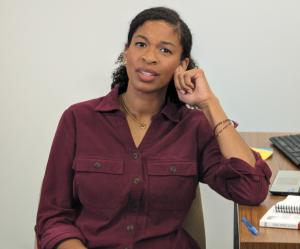
New Virtual Reality Training is Designed to Help Black Autistic Youth Who Struggle with Asking for a Teacher’s Help
Asking for help can be viewed as a sign of weakness, yet seeking help is an important strategy for learning & growth. New training provides realistic practice.
COLUMBIA, MD, UNITED STATES, May 7, 2024 /EINPresswire.com/ -- Why “Learning to Seek Help” Matters
Students often “avoid asking for help because they see it as a sign of weakness. In the classroom context, worries around competence can be especially powerful barriers. Educational psychologist Allison M. Ryan of the University of Michigan and her colleagues observe that students may perceive that asking for help means they aren’t capable or smart, which can be damaging to their self-image. … Researchers note that seeking help … can cultivate productive long-term habits.” (See https://yup.com/blog/students-ask-for-help/ ).
A Collaborative Approach for Addressing a Mental Health Need
Asking for help is especially difficult for Black autistic youths with mental health needs. A new training system using a virtual teacher has been developed by SIMmersion in collaboration with Boston College School of Social Work with the goal of helping these youths learn to ask for help from their teachers.
Realistic Virtual Experiences are Expected to Provide Effective Training
The training system puts students in a virtual classroom setting where they can practice asking for help from a teacher, named Ms. Daniels. Her character ranges from being an easy-going teacher to an instructor in crisis mode, representing teachers who may need to try to assist students. The teacher variations help provide students with situations similar to ones they may encounter in the classroom. The students can also pick from a list of emotions that describe how they are feeling, including anger, guilt, hopelessness, hurt, impaired, or sadness.
Realistic experiences provide students with practice in asking for help in a way that is respectful and effective in the sometimes-chaotic classroom environment. Since the conversation is with a virtual teacher, not a real one, the common fears of projecting that they aren’t capable, or smart are diminished. The research team anticipates that the training will help students overcome the fear of asking for help while building their self-confidence and helping them overcome a major barrier to academic success.
The training is being evaluated through research efforts conducted by Dr. Ed-Dee G. Williams, an assistant professor at Boston College School of Social Work who is dedicated to improving the mental health of Black youth.
The Research and Development Effort
"SIMmersion has done incredible work in developing and evaluating effective simulations," said Dr, Ed-Dee Williams. "Specifically, their work with autistic youth and the unique tailoring of their simulations strongly attracted me to want to partner with them to develop the Asking for Help simulation."
SIMmersion is excited to partner with Williams to make this training a reality. His research is just beginning. If you are interested in learning more about how to join this research effort, please contact: Dr. Ed-Dee Williams at (Ed-Dee.Williams@bc.edu).
About SIMmersion
SIMmersion LLC is dedicated to revolutionizing communication skills training by integrating realistic simulation experiences, interactive content, and comprehensive feedback. With a track record spanning over two decades, SIMmersion has developed numerous NIH-funded simulations that provide students with hands-on practice in scenarios encountered with real-life individuals. Backed by extensive research, these simulations consistently demonstrate their effectiveness in skill acquisition and retention. To learn more about the simulation and other SIMmersion products and technology, please visit simmersion.com.
About Boston College School of Social Work
The Boston College School of Social Work is a global leader in social work education, dedicated to finding solutions to the pressing social issues of our time through pioneering practice and research. Grounded in Boston College's 161-year tradition of service, this institution pursues the highest standards of intellectual rigor alongside a deep commitment to social justice, developing practitioners who think in new ways to improve the lives of others.
Dale Edward Olsen
SIMmersion
+1 443-745-5754
email us here
Visit us on social media:
Facebook
Twitter
LinkedIn
YouTube
SIMmersion's PeopleSim(R) Technology
EIN Presswire does not exercise editorial control over third-party content provided, uploaded, published, or distributed by users of EIN Presswire. We are a distributor, not a publisher, of 3rd party content. Such content may contain the views, opinions, statements, offers, and other material of the respective users, suppliers, participants, or authors.




